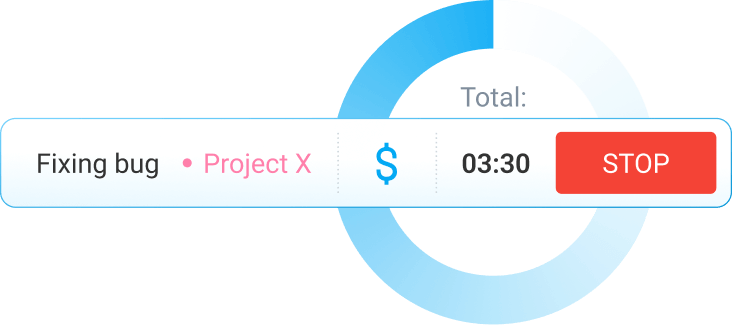How Freelancers Spend Time — Statistics for 2025 (and Beyond)

We'll just go ahead and assume around half of your friends and acquaintances are so-called freelancers. The popularity rate of freelance work has been on the rise for almost a decade, and there are no signs of it slowing down.
After conducting thorough research, we've dissected the topic - so you won't have to.
Now read on and check out our comprehensive list of all the relevant and great-for-trivia-nights stats and facts about how freelancers spend time, as well as:
- Their preferences,
- Common skills and habits,
- Typical challenges they face, and much more.
Let's start!
KEY TAKEAWAYS
- The estimated number of freelancers in the world is 1.57 billion.
- Approximately 38% of the US workforce does freelance work.
- Over half (51%) of US freelance workers have a postgraduate degree.
- Gen Z makes up the majority of freelancers in the US.
- As many as 38% of freelancers spend over 41 hours on work-related activities.
- About 19% of freelancers didn't have health insurance in 2023.
- About half of freelancers work 5 days a week.
- Almost half of freelancers spend 6 hours on average on unproductive work.
- Around 40% of freelancers rely on software for billing clients.
- IT and programming industry freelancers spend the least amount of time looking for work.
What does a freelancer do?
Before diving into more details, let’s first determine what it means to be a freelancer.
Well, without a 9-to-5 steady schedule, employers, and hierarchy, freelancers are basically self-employed workers.
Here’s a brief description of what it is like to be a freelance worker:
- Freelancers earn wages on a per-job, per-hour, or per-task basis,
- Freelancers have no long-term commitment to a particular employer or a company, and
- Freelancers get hired to do specific assignments and tasks.
For freelancers, the ability to create a unique and tailored work schedule and collaborate with clients from around the world makes all the difference.
For illustration, the freelance work model gives workers more freedom in choosing:
- Projects,
- Clients,
- Strategies, and
- Scope of their daily workload.
As you can see, there’s an abundance of benefits to being a freelancer.
What’s more, freelancers have no other supervisors but themselves. However, this can be a double-edged sword, especially for people who have a tendency to procrastinate or are easily distracted from deep work.
After all, things aren’t always black and white, are they?
The truth is, being a freelancer isn’t everyone’s cup of tea, and some people simply can’t thrive in such a working environment.
However, it turns out that most people who do thrive as freelancers have something in common — they share a similar set of skills. Let’s check out which skills are most in demand when it comes to the freelance work model.
🎓 30+ Time Management Tips for Freelancers
Top in-demand freelance skills
The first thing to mention is the demand for specific freelance skills on the market — some skills are more in demand than others.
One of the biggest platforms for freelancers, Upwork, reported that the fastest-growing skills on their platform include AI data annotation and generative AI modeling. As of 2024, the demand for these specializations has increased by as much as 220%.
The same report points out 6 most in-demand categories of skills and services:
- Accounting and consulting,
- Coding and web development,
- Customer service and admin support,
- Data science and analytics,
- Design and creative, and
- Sales and marketing.
The services freelancers provide are mostly knowledge-based, as per Upwork’s Freelance Forward report:
- 47% of freelancers provide knowledge/skilled services (e.g. computer programming, marketing),
- 34% of freelancers provide unskilled services (e.g. dog-walking, ride-sharing),
- 27% of freelancers sell goods,
- 23% of freelancers provide influencer-style content (e.g. blogs, social media videos/images, live-streaming), and
- 16% of freelancers provide other services.
As you can see from the list above, the freelance workforce is there to fill a talent gap for a broad range of professional skills. Now, let’s go into more detail about the global and US freelance workforce.
Freelance workforce statistics worldwide
We’ll start by mentioning the most important stats and facts about the freelancing industry and its workforce.
Currently, it’s estimated that there are 1.57 billion freelancers in the world — which translates to roughly 48% of the global workforce.
Countries with the most freelancers in 2025
According to the data for the first half of 2024, the top 10 countries with the highest number of freelancers are:
- United States,
- United Kingdom,
- Canada,
- United Arab Emirates,
- Philippines,
- India,
- France,
- Brazil,
- Australia, and
- South Africa.
Now, let’s focus on the US, as the area is the largest market for freelance work — so check out the most relevant statistics.
Freelancers in the US
According to MBO’s State of Independence in America 2024 report, 72.7 million US citizens did some freelance work in 2024. This makes up about 45% of the US workforce.
When divided according to the type of freelancers’ employment, there are:
- 36.5 million occasional independents,
- 27.7 million full-time independents, and
- 8.5 million part-time independents.
The number of freelancers is expected to continue growing. By 2028, the number of freelance workers in the US is expected to reach 90.1 million.
Common occupations for US freelancers
When you think of freelancers in general, you think of the gig economy, and certain occupations naturally come to mind, such as:
- Software developers,
- UX/UI designers,
- Content and copywriters,
- Foreign language teachers, and
- Artists (creative writers, musicians, dancers, painters, etc.).
As you can see, different industries and sectors inherently determine some aspects of freelancing.
Here’s an example from Upwork’s Freelance Forward Report — while around 77% of arts and design workers were freelancers in 2021, the percentage is only 20% for the production and manufacturing industry.
US freelancers and education
When it comes to education, Upwork’s Freelance Forward Economist Report revealed that more than half of freelancers in the US (51%) have a postgraduate degree.
The following 2 academic levels were tied for the second place:
- Bachelor’s degree (35%), and
- Some college or associate degree (35%).
Less than one-third, or 31% of survey respondents, reported their education level is high school graduate or lower.
US freelancers and age groups
Now let’s see if there is any disparity between different generations and freelancing in the US.
Upwork’s 2023 study indicates that freelancing in the US is most popular among Gen Z, with 52% of surveyed workers in this age group having performed freelance work in 2023.
Regarding other generations, the data shows that:
- Millennials (who took the number one spot in older studies) are still commonly freelancing, with the percentage being 44%,
- Gen X is at 30%, and
- Baby Boomers are still taking up the final spot, with only 26% freelancers.
Evidently, freelancing attracts younger generations. This isn’t much of a surprise, given that these are the generations that grew up as digital natives.
Why US workers opt for freelance work model
Insights from a McKinsey survey indicate the main reasons US workers turn to freelancing include:
- To support basic family needs — 25.7%,
- For autonomy and flexibility — 24.9%,
- Really enjoy their work — 24.7%,
- Additional income — 19.5%, and
- Other — 5.2%.
Being an autonomous entity comes hand in hand with another important benefit — work location independence.
Regardless of minor choices such as a local cafe or a home office, a business casual dress code or pajamas, music or no music, and whether one is an early bird or a night owl, one thing is certain: freelancers are becoming an integral part of both the US and global economy.
🎓 26 Best Apps for Freelancers
Top 5 common freelancer challenges
While risking to sound cliche — the truth is — with great power comes great responsibility.
Being your own boss comes with a myriad of issues and drawbacks. So, let’s check out the most common challenges freelance workers encounter.
Issue #1: Late paying clients
According to Remote’s 2025 report, a whopping 85% of freelance respondents claim to have experienced late invoice payments.
What’s more alarming is that over 21% of freelancers reported getting paid late (or never) more than half the time. This means that 1 in 5 freelance workers do more jobs that end up unpaid or paid late.
🎓 How to Ask for Payment Professionally (+ Templates)
Issue #2: The lack of adequate invoicing software
When it comes to the accounting and legal part of freelancing, there are 2 options:
- Hire a professional, or
- Keep track of invoices, taxes, and payments yourself.
A report by the Independent Economy Council indicates that 40% of freelancers choose to leverage the power of technology and use software for this purpose.
On the other hand, 38% use Microsoft Word or Google Docs to create invoices from scratch, while 21% fill templates they downloaded.
Software usage significantly reduces the margin for human error and time spent on repetitive tasks.
An example of powerful software you can use to record expenses and bill clients is Clockify by CAKE.com.
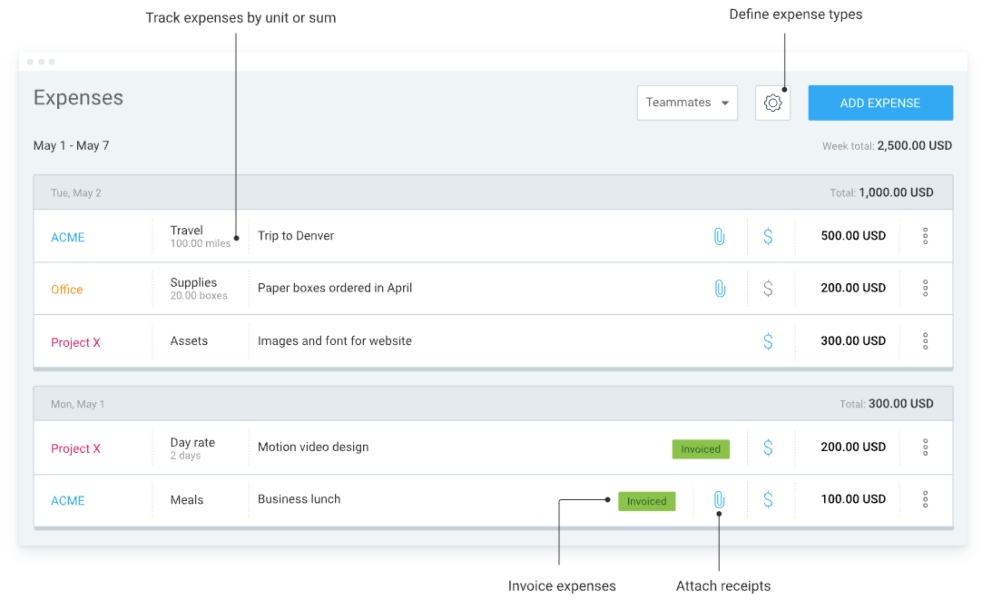
Clockify’s expense tracking feature allows you to log:
- Fixed fees — such as daily rates and overtime pay, and
- Unit-based expenses — expenses that are calculated per specific number of days, hours, mileage, materials, etc.
You can then use this data to bill your clients as accurately as possible. This saves you the time you would otherwise spend correcting billing errors but also limits potential disputes with clients that could damage your reputation.
Issue #3: The lack of insurance and benefits
Traditional workers have traditional benefits, such as health insurance coverage, paid time off, and overtime pay.
On the other hand, the lack of common benefits is definitely a drawback of freelancing. In 2023, around 19% of freelancers reported not having health insurance. The top reason they cited was not being able to afford insurance.
Issue #4: Spending their personal money on business-related expenses
A stunning 63% of freelancers admit to using their personal savings to cover bills and expenses. As we’ve mentioned earlier, they often have to deal with late-paying clients, and spending their personal savings comes in handy to bridge the gaps.
Here are several examples of where their money usually goes to:
- The cost of stable broadband internet access,
- Necessary monthly subscriptions, services, and accounts,
- Computer hardware upgrades,
- Data retention tools,
- Computer security,
- Communication tools,
- Website hosting and maintenance,
- Paid add-ons, etc.
Issue #5: The lack of stable income
For most freelancers, income uncertainty is closely tied to stress and anxiety and can lead to burnout and depression.
Living on a month-to-month basis is not only frustrating, but it can rather have a long-term deteriorating effect on our physical and mental health.
This income volatility and the lack of financial stability make the gig economy completely unappealing to some, even with all its perks.
🎓 110+ Best Freelance Websites to Find Work
How much time do freelancers spend working
Freelancers spend most of their time on the following activities:
- Billable work (coding, content writing, project revisions, and any other work directly related to the client’s project),
- Non-billable work (promoting and managing their business),
- Following up on client payments, and
- Considering various improvements to their work routine.
According to a freelancer survey from 2024, freelancers spend the following amount of time on their freelance work per week:
- 41+ hours — 38% of freelancers,
- 39–40 hours — 31% of freelancers,
- 31–38 hours — 11% of freelancers,
- 21–30 hours — 11% of freelancers,
- 11–20 hours — 5% of freelancers, and
- Less than 10 hours — 4% of freelancers.
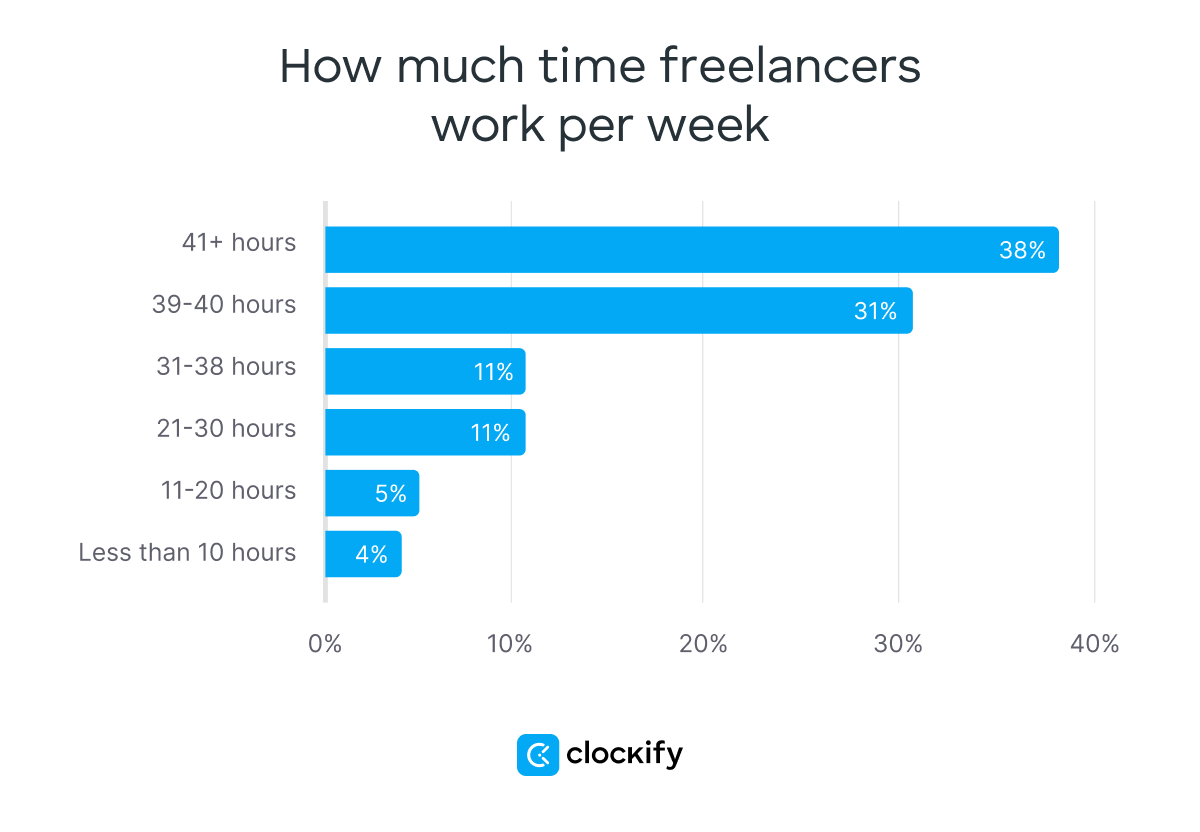
When it comes to how these hours are distributed throughout the week, Freelancer Map reports the following:
- 54% of freelancers work 5 days a week,
- 27% of freelancers work over 5 days a week,
- 12% of freelancers work 4 days a week, and
- 8% of freelancers work less than 4 days a week.
How much time do freelancers spend on non-billable work
The time you spend freelancing includes both billable and non-billable work.
Freelancers may spend a lot of time on non-billable work because they run their entire businesses themselves and must address additional points.
According to the previously mentioned survey by Freelancer Map, freelancers dedicate the following amount of time to administrative tasks, such as accounting and client acquisition:
- 47% of freelancers — 10–20% of the time,
- 37% of freelancers — less than 10% of the time, and
- 16% of freelancers — more than 20% of the time.
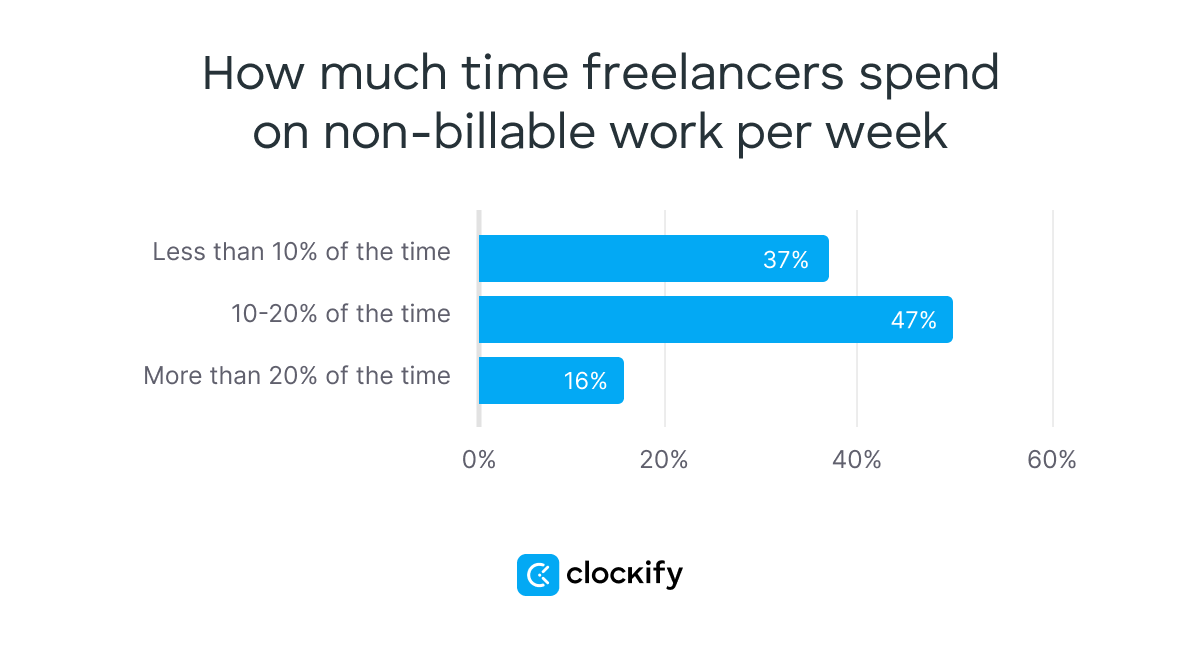
This report suggests that almost half of freelancers spend approximately 6 hours a week on non-billable activities (administration and accounting).
How much time freelancers spend looking for work
Full-time employees get assigned work by their immediate superiors, but freelancers often have to look for work themselves.
Unless they find work on a regular basis, they aren't able to sustain their business, so they put dedicated time and effort into this activity.
According to the data from Payoneer research, the following industries spend the following number of hours on finding work:
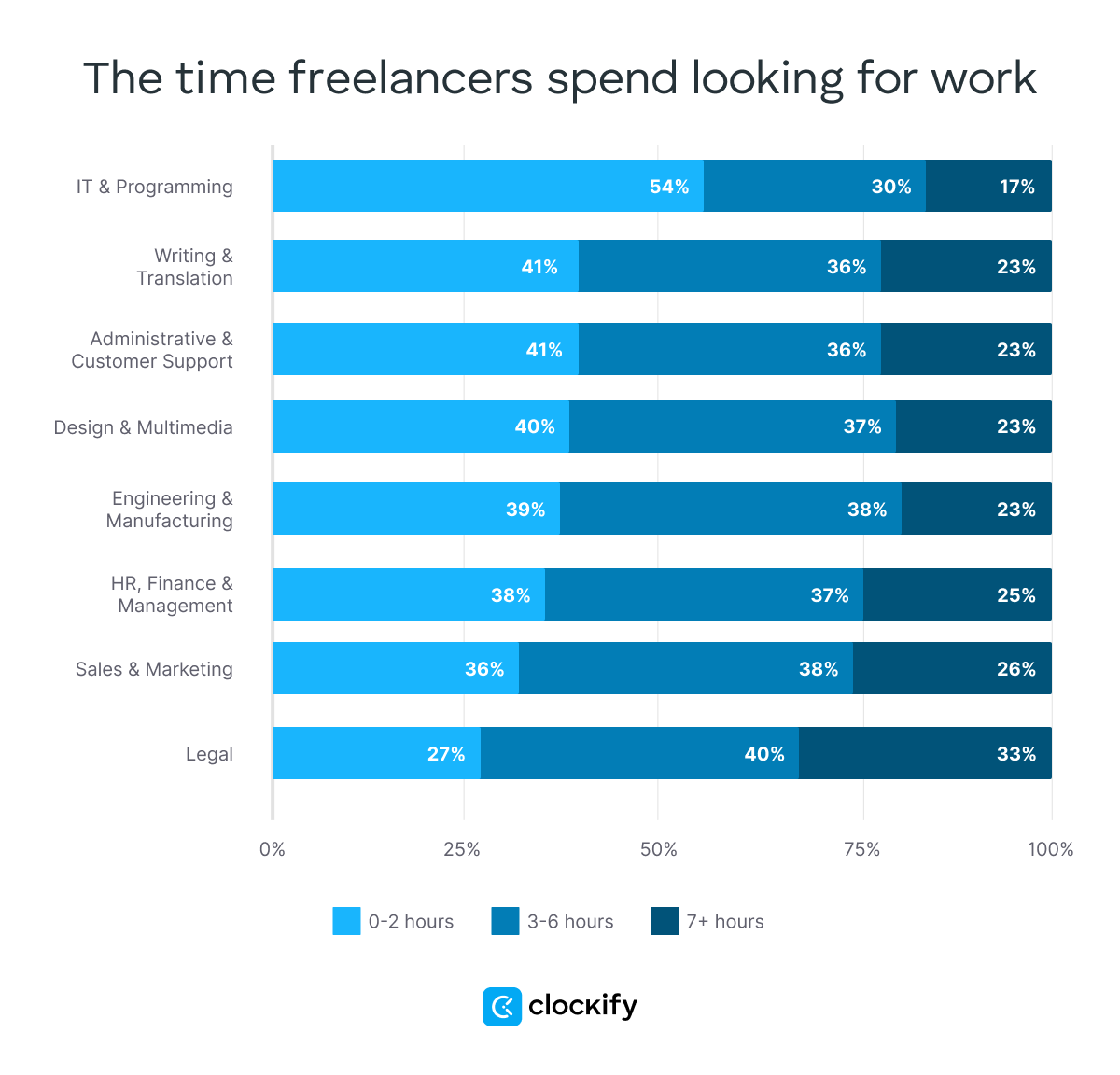
As we can see in the bar above, freelancers in the IT & programming industry spend the least amount of time looking for new work, and data shows:
- 54% spend up to 2 hours,
- 30% spend 3-6 hours, while
- 17% spend 7+ hours searching for work.
Interestingly, the IT sector freelancers (particularly software developers) have the highest average hourly rates — from $31.01 for junior developers to $55.85 for the highly experienced.
On the other hand, freelancers in the legal industry spend the most time finding work:
- 33% of them spend 7+ hours,
- 40% spend 3-6 hours, and
- 27% manage to find new work in 2 hours or under.
The explanation is rather simple — IT experts are more likely to land long-term clients, while legal experts are mostly needed on singular projects or for one-off legal advice.
How much time do freelancers spend on business management
Appealing to the target market is the best way to secure yourself a steady stream of work, making marketing an important part of successful freelancing.
In addition to promotion, freelancers have to dedicate some time to business management as well, as they usually handle these activities themselves.
Managing your freelance business often includes the following activities:
- Creating contracts,
- Generating invoices,
- Following up on late payments,
- Traveling to attend meetings, when in-person meetings are required,
- Various tax preparation,
- Reporting and considering expenses,
- Purchasing supplies vital to your work, and
- Networking with prospective associates on relevant events.
In addition, marketing and promoting your expertise and skills can include:
- Obtaining testimonials and referrals from satisfied clients,
- Displaying results from your successfully finished projects,
- Handling a business website or blog where you'll constantly include new content,
- Guest blogging on relevant websites,
- Sending out cold emails and pitches to prospective clients,
- Being active on social media and answering questions on forums related to your field of work, and
- Procuring Social Media advertisements.
Managing and promoting your business are both non-billable types of activities, but are both vital to keep your business operating — without them, you'd most likely find yourself out of business in a short time.
When it comes to freelance writers, here's how much time they spend on promoting and managing their business, according to the survey we’ve mentioned above:
- Less than 2 hours — 38%,
- 2–4 hours — 23%,
- 4–6 hours — 15%,
- 6–8 hours — 13%,
- 1–2 days a week — 10%, and
- 2 or more days a week — 5%.
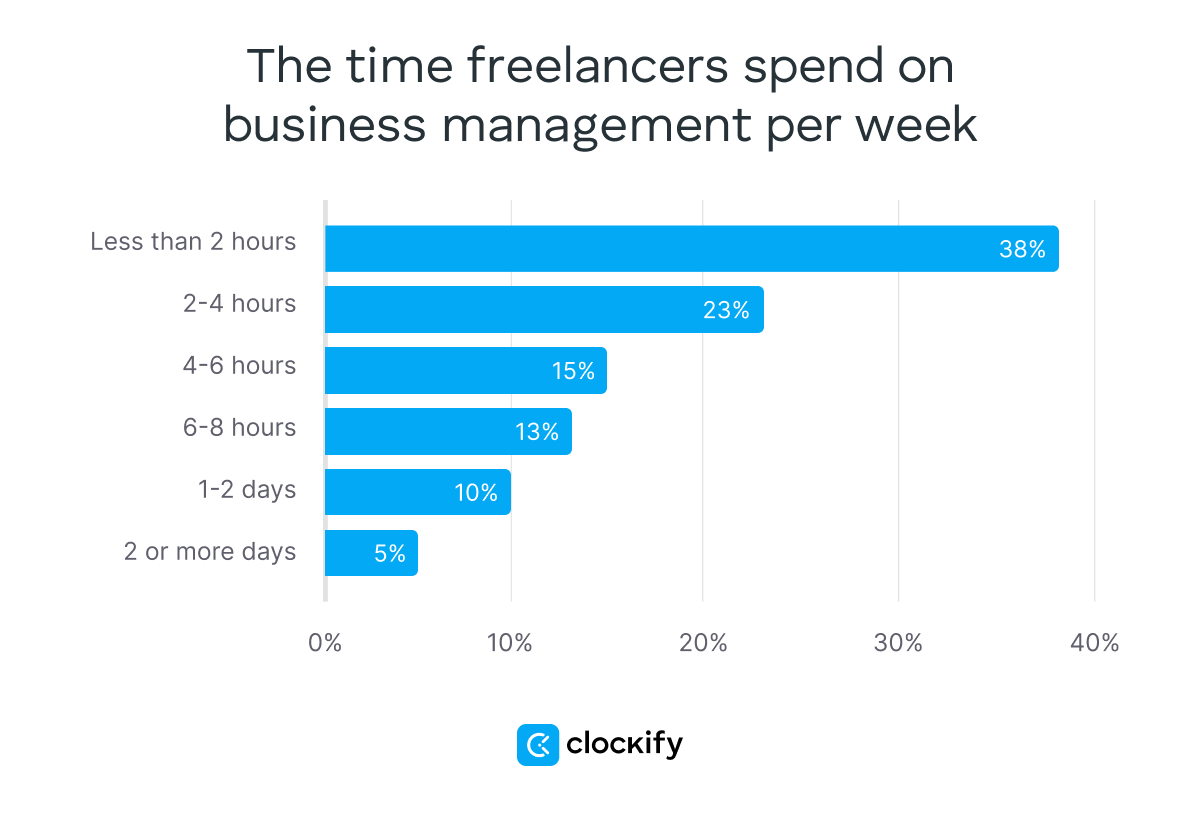
According to this data, freelance writers don't spend too much time on promotion and business management — most of them (38%) spend less than 2 hours on this type of activity.
In total, only about 10% spend 1-2 full days, and only 5% spend 2 days or more.
A typical day in the life of a freelancer
Each freelancer has a different everyday routine — what they all have in common is their difference from traditional full-time employees, who typically have a more structured, less flexible day.
Of course, this doesn't mean freelancers' days aren't structured; they're just prone to more changes dictated by personal needs, biological prime time, or client requests.
Freelancers during the first part of their workday
The early morning part of the day can significantly vary for freelancers, depending on their specific client and necessary tasks for the day. However, in order to grasp the concept better, here’s an example of a freelancer’s early morning routine:
- 7–8 am: Wake up time. Freelancers don't have a 9-to-5 routine, so they don't have to perform serious work in the morning. If they have to do some important work, they typically get up around 7 am, but on other days, they can allow themselves to sleep longer. As freelancers sometimes work for clients in different time zones, they may have to start working at a later time, even at night. When this is the case, they sometimes forgo the morning routine and get up later to be better rested for the time they'll have to perform meaningful work.
- 9–9:30 am: Breakfast, coupled with checking the email inbox. Freelancers often communicate with clients via email, so they may check their inboxes more frequently. This is also the typical time to check the social media feed and the news and articles freelancers missed while sleeping.
- 9:30–10:30 am: Active communication with clients via email or phone. This is the time to go over project details, address potential issues, and send a progress report.
Freelancers and the deep work mode
Now, what usually happens after the morning tasks is the so-called deep work mode. It’s basically the part of the day when freelancers focus on their highest-priority tasks. Here’s an example:
- 10:30 am–1 pm: Working on projects, with occasional short breaks. This is the time freelancers typically do their most meaningful work — writers work on their content, developers code, and graphic designers work on their visual concepts.
- 1–1:30 pm: Lunch break. Time to unwind over a nice meal before going back to work.
- 1:30–4:30 pm: More meaningful work. This may be the time to finish up some projects, address additional issues, go over some details, as well as make adjustments and improvements. As the end of the official workday approaches, freelancers check their email inboxes again and follow up on some client concerns and questions.
Freelancers during the final part of their workday
After they’ve successfully dealt with the highest-priority tasks, freelancers tend to switch their focus to other, often more administrative and marketing-related tasks. So here’s what that may look like:
- 4:30–5 pm: This is the time to look for new clients and jobs and otherwise promote the freelancing business. This may include activities like:
- Scrolling job boards to look for new potential projects,
- Finishing up a guest post for a website whose audience typically needs the services provided by the freelancer,
- Formulating email pitches and reaching out to potential new clients, and
- Other promotional activities.
- 5–6 pm: Time to address administration, such as tax preparation, generating and sending invoices, and other administrative paperwork. This is also the time to follow up on late payments and keep track of expenses.
- 6 pm–onwards: Time for non-work activities — unwinding with friends and family, having dinner, focusing on a hobby, or going out. However, freelancers often have to be on call, as some client communication and additional work is possible in the evening, depending on the type of freelance work and the time zone of the clients.
Fun facts about freelancing
Before we wrap the article up, let’s check out several interesting facts about the freelancing world.
#1: The etymology of the term “freelance”
Did you know that “freelance” comes from the early 1800s in the British Empire? Well, it’s said that the term “freelance” dates back to 1819 when it was used as a reference to soldiers who worked for payment (instead of their loyalty to the king).
The modern, non-hyphenated version of the word “freelance” emerged in the 1970s, before which it had adopted several other layers and interpretations, such as being a common term for independent politicians.
#2: The vast majority of freelancers find work through online marketplaces
According to Payoneer’s 2023 Freelancer Report, as many as 70% of freelancers find jobs via online marketplaces. In contrast, only 11% of freelancers still use the more traditional tactics, such as referrals.
#3: Freelancers are more likely to pursue training, education, and credentials than permanent workers
In line with a McKinsey report, freelance workers are 1.4 times more likely than traditional employees to work on improving their skills and ensuring their knowledge doesn’t stagnate.
Moreover, the same McKinsey article reveals another similar tendency among freelance workers: They are 1.5 times more likely to pursue career advancement opportunities than permanent workers.
Manage your freelance work more effectively with the CAKE.com suite
As a freelancer, you need tools to help you manage your projects, client communication, time, and invoices with ease.
You can do all that with the CAKE.com BUNDLE, which includes:
- Clockify — a time and expense management tool,
- Plaky — a project management tool, and
- Pumble — a communication tool.
As the statistics suggest, freelancers spend a lot of time on administrative, non-billable work, such as invoicing their clients.
To reduce the amount of time you waste on invoice creation — use a reliable tool like Clockify! This piece of software allows you to:
- Accurately track work time and expenses,
- Easily mark work time and expenses as billable or unbillable,
- Quickly create invoices from tracked billable hours and expenses,
- Conveniently set statuses for created invoices (e.g. sent, unsent, paid), and
- Automatically calculate discounts and taxes once you add them to your invoice.
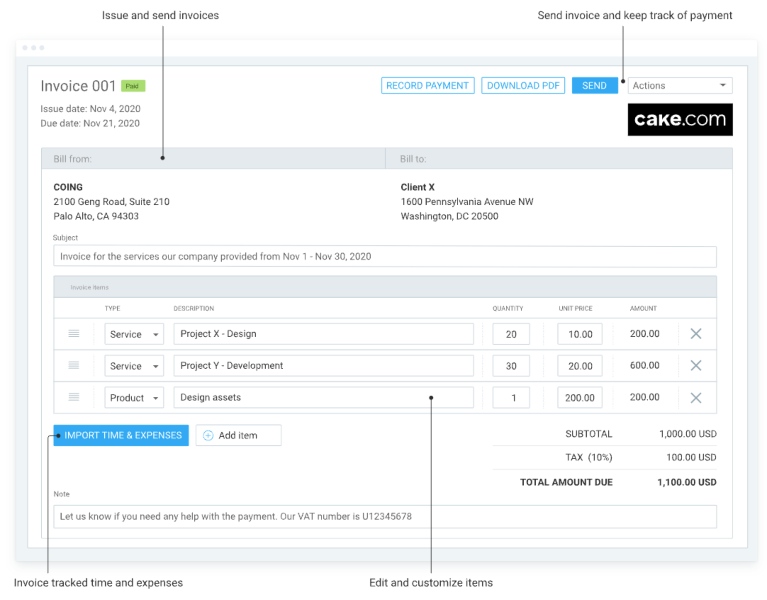
Therefore, as a reliable all-in-one time tracking and invoicing software, Clockify can both improve your time management and help you bill clients quickly and accurately.
As for managing complex projects — leave that to Plaky, as this powerful app lets you:
- Plan your projects by creating to-do lists,
- Divide large projects into tasks and subtasks,
- Track project progress by setting statuses (such as in progress, on hold, and done), and
- Create custom fields to add due dates, notes, files, and other information to your tasks.
Finally, ditch snail-paced email communication — instead, use Pumble to communicate with clients efficiently. With Pumble, you can:
- Create public and private channels,
- Send direct messages,
- Make voice or video calls, and
- Share files.
The CAKE.com suite gives you full access to Clockify, Plaky, and Pumble’s highest-tier plan for one affordable price.
